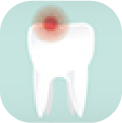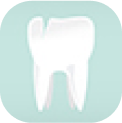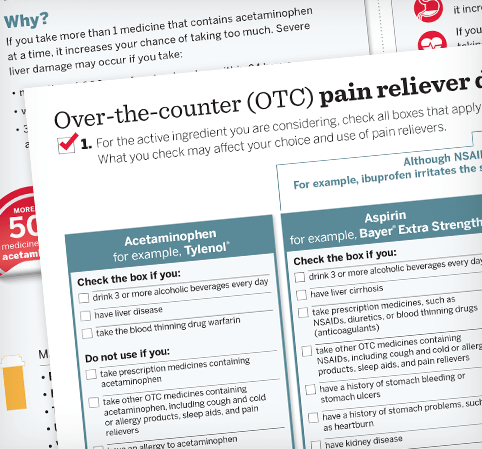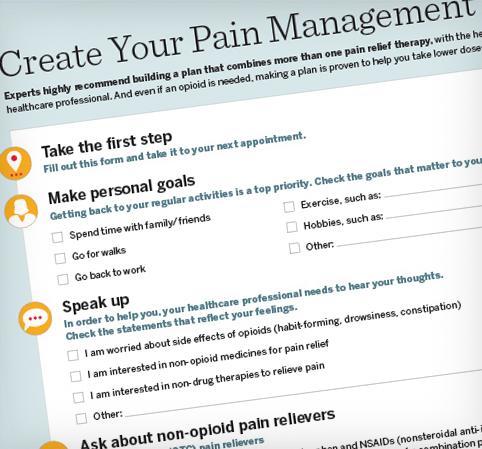Get your pain reliever dose right. Why?
If you take more medicine than the label says, you may increase your chance of serious side effects. To use OTC pain relievers safely:
Take the dose directed on the label. Even if you’re in a lot of pain, it’s not safe to take more medicine than the label says.
Wait the right amount of time between doses.
Don't take more than the daily limit.
Take ONLY 1 medicine with the same kind of active ingredient at a time.
If your pain lasts for more than 10 days, stop taking the medicine and see your healthcare professional.
Remember, it’s important to identify the cause of your tooth pain. Only a dental professional can do this. Find a dentist
When you have a throbbing toothache, the pain can be unbearable. While a pain reliever may provide temporary relief, it will not fix the cause of your toothache pain. This is where your dentist can help, so make an appointment as soon as possible. In the meantime, see below for information on different types of tooth pain–toothache, cracked or broken teeth, jaw popping or TMJ pain, pain after dental surgery–and tips for getting tooth pain relief safely.
Managing different types of tooth pain

Toothache
What a toothache feels like:
Pain that can be continuous, sharp, or throbbing; pain when chewing
Possible causes of toothache:
Decay or cavity, infection, pain from dental surgery, gum disease, abscess, impacted tooth, or broken or chipped tooth.
Tips to help relieve a toothache:
Clean your mouth by rinsing with warm, salt water.
Use dental floss to remove food.
Contact your dentist right away if pain is severe or lasts more than a day or two.

Cracked or broken teeth
What a cracked or broken tooth feels like:
Brief sharp pain when biting down; possible sensitivity to very hot or very cold temperatures.
Possible causes of cracked or broken teeth:
Brittle teeth, teeth grinding, or injury.
Tip for toothache relief from cracked or broken teeth:
Talk to your dentist. He or she can find the source of your pain and determine the best treatment for you.

Jaw popping or TMJ pain
What jaw popping or TMJ pain feels like:
Ear pain, popping or clicking when opening your mouth, headaches.
Possible causes of jaw pain:
Toothache, TMJ disorder (a jaw joint and muscle disorder), teeth grinding while sleeping, dislocation, or injury of the jaw.
Tips for toothache relief from jaw popping or TMJ pain:
Talk to your healthcare professional. He or she can find the source of your pain and determine the best treatment for you.
Try gentle jaw stretching exercises or physical therapy.

Pain after dental surgery
What post-surgery pain feels like:
Tenderness, discomfort, and/or swelling, depending on the procedure.
Types of dental surgery:
Root canal, tooth removal, wisdom tooth removal, or other dental procedures.
Did your dentist prescribe an Rx pain medication?
After dental surgery, it is common for a dentist to give patients a prescription (Rx) for tooth pain relief. Some of these medicines, such as Vicodin® or Percocet®, may contain acetaminophen. Did you know that acetaminophen is also found in many OTC pain relievers, such as Tylenol®? In fact, it’s found in more than 500 OTC and prescription medicines. Taking more than one medicine that contains acetaminophen at a time can increase your chance of liver damage.
To use a prescription pain medicine safely:
Check every Rx and OTC label, and take ONLY 1 medicine containing acetaminophen at a time.
Read and follow the medicine’s label.
Keep and read all paperwork that is provided with the medicine.

Find a dentist near you
If you need help finding a dentist, the American Dental Association (ADA) offers a dentist locator.
Are you concerned about dental care costs?
If you’re putting off seeing a dentist for tooth pain because of concerns about costs, there are a couple of things to keep in mind:
First, seeing a dentist early can be more affordable than if you wait until your toothache gets worse.
Second, if you need financial help, you can find out more about assistance programs that may help cover dental costs.
The inclusion of the link to the American Dental Association Find-a-Dentist tool does not constitute or imply an endorsement of these dentists by Kenvue Brands LLC.
Third party trademarks used herein are trademarks of their respective owners.

Compare OTC pain relievers
OTC pain reliever differences could matter to your health

Want a downloadable option?
Fill out this form and take it to your next appointment.

